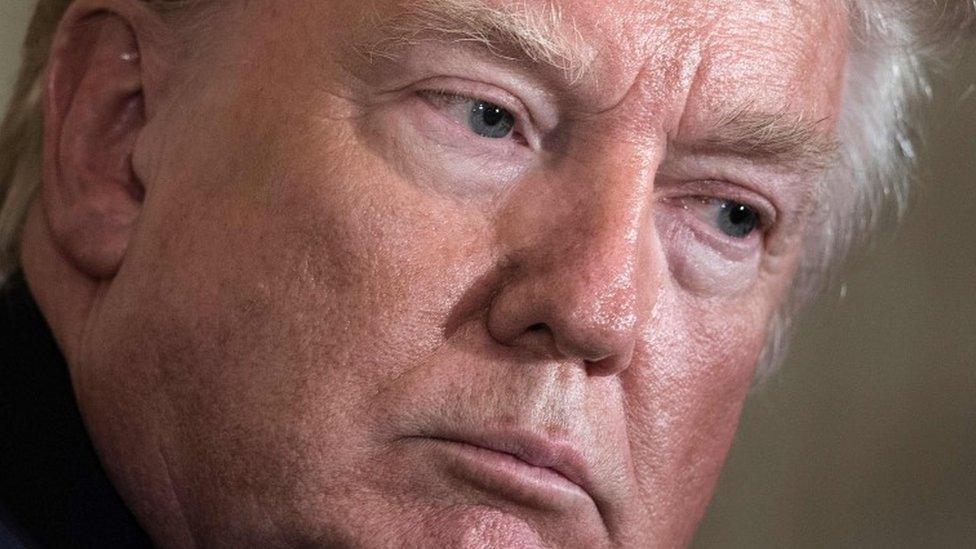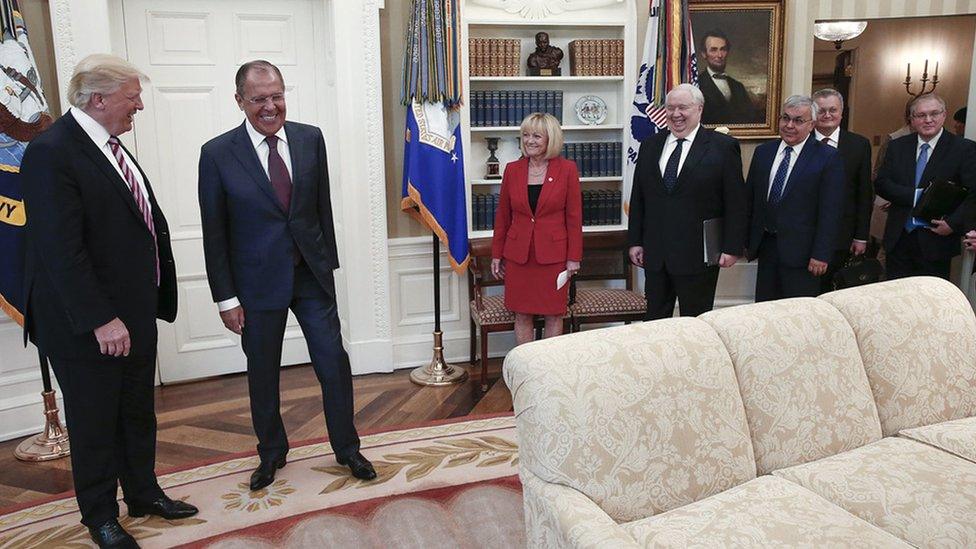Trump: Firing 'nut job' FBI chief 'eased pressure'
- Published

Mr Trump reportedly called the former FBI chief a "real nut job"
US President Donald Trump told Russian officials that firing FBI director James Comey eased "great pressure" on him, US media report.
The New York Times, external, citing a document summarising last week's meeting, says he called Mr Comey a "real nut job".
Mr Comey had been running an inquiry into possible collusion between Russia and Donald Trump's election campaign.
The ex-FBI chief has agreed to testify before the Senate Intelligence Committee about the investigation.
The latest report was published just as Mr Trump took off on a flight to the Middle East for the first leg of his first foreign tour as president.
"I just fired the head of the F.B.I. He was crazy, a real nut job," Mr. Trump said, according to the report.
"I faced great pressure because of Russia. That's taken off."
The White House has not disputed the language used in the meeting at the Oval Office between Mr Trump, Russian Foreign Minister Sergei Lavrov and the Russian Ambassador Sergei Kislyak.
In another development, the Washington Post reported, external that a current White House official is a "significant person of interest" in the investigation into alleged links between the Trump campaign and Russia.
It quoted unnamed sources familiar with the investigation as saying it was someone "close to the president" but they would not identify them further. The White House has denied there was collusion between the campaign and any "foreign entity".

Evidence mounts - Anthony Zurcher, BBC North America reporter
Donald Trump called the ongoing Russia investigation a "witch hunt", but reporters have just found a boiling cauldron and a closet full of broomsticks.
The key takeaway from these latest blockbuster stories - there have been so many this week it's hard to keep count - is there's now further evidence of Mr Trump's intent to dismiss FBI Director James Comey because of his handling of the ongoing Russia investigation.
That this revelation came as a result of a meeting with Russian officials, one of whom is a key figure in the investigation, is just the icing on the cake.
What's more, it now appears this investigation has expanded to involve an individual who currently holds a senior post within the White House, not just an ex-aide (Michael Flynn) or campaign official (Paul Manafort). If that's the case, it's only a matter of time before subpoenas are issued and the entire administration adopts a bunker mentality.
Donald Trump reportedly told his Russian guests that firing Mr Comey had relieved the "great pressure" his administration was under because of the Russia investigation.
That, it turns out, was wishful thinking in the extreme.

Warning that leaks were undermining national security, White House Press Secretary Sean Spicer said: "By grandstanding and politicising the investigation into Russia's actions, James Comey created unnecessary pressure on our ability to engage and negotiate with Russia.
"The investigation would have always continued, and obviously, the termination of Comey would not have ended it."
The BBC's Gary O'Donoghue, in Washington, says the White House has chosen to interpret the president's words as relating to the national interest rather than to himself.

Russia released photographs of the meeting between Mr Trump and Sergei Lavrov at the White House
The summary was drawn from a formal account of last week's meeting, which was attended by Russian Ambassador Sergei Kislyak - a man at the centre of many of the controversial contacts between the Trump campaign and senior Russian officials.
Mr Trump had fired Mr Comey the evening before, a move that sent shockwaves through Washington.
Critics accused the president of trying to thwart the FBI investigation into Russia's alleged interference in the US election and any Moscow ties to Trump associates.
Mr Comey has agreed to give details of the investigation to the US Senate Intelligence Committee at a public hearing, as well as take questions surrounding his dismissal. The date has not yet been scheduled, but is expected to take place next month.